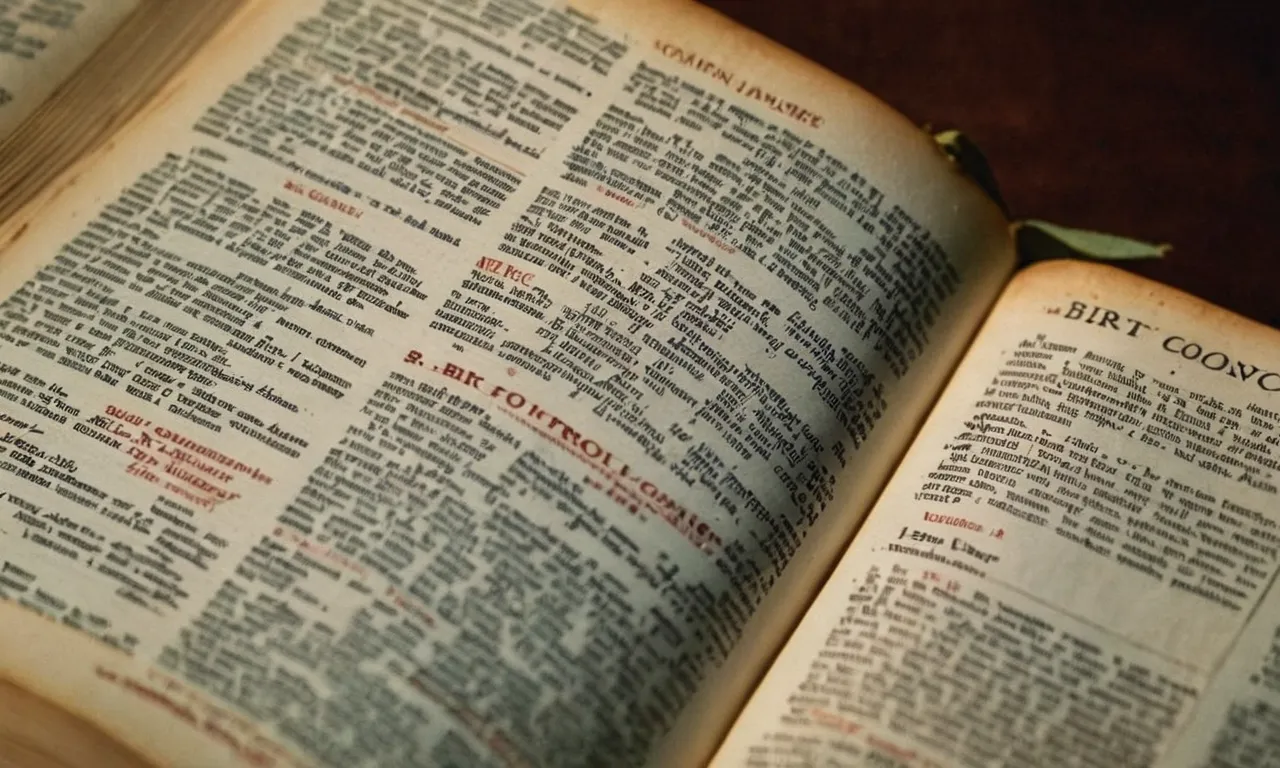What Does The Bible Say About Birth Control?
The question of whether birth control is acceptable according to biblical principles is one that has been debated for centuries amongst Christians. In this comprehensive article, we will examine multiple angles of this complex issue, considering key biblical passages as well as perspectives from different Christian traditions over the years.
If you’re short on time, here’s a quick answer: The Bible does not directly prohibit or condone birth control. Scholars and Christian traditions have interpreted various biblical principles and passages differently in regards to the ethics and use of birth control.
Old Testament Principles Regarding Children and Family Planning
Be Fruitful and Multiply
The first command in the Bible given to Adam and Eve was to “be fruitful and multiply” (Genesis 1:28). This establishes God’s intent for marriage to produce children. The psalmist echoes this by saying that children are a “reward” and “heritage” from the Lord (Psalm 127:3-5).
At creation, God established the family unit and intended for humanity to grow through childbirth.
Acceptance of Non-Procreative Sex
However, the Bible portrays an acceptance of marital relations without the intent to reproduce. The Old Testament never directly prohibits non-procreative sex. And passages like Proverbs 5:18-19 and the Song of Solomon depict marital sex as being for pleasure and intimacy, not strictly for procreation.
Withdrawal Method Mentioned
Interestingly, the Bible references the withdrawal method as an acceptable form of contraception. Genesis 38:9-10 depicts Onan as wicked for practicing coitus interruptus with Tamar, not because he spilled his semen but because he violated custom by refusing to raise offspring for his deceased brother.
Spiritual Significance of Children
Lastly, Scripture shows how raising children allows parents to reflect God’s parenthood. Passages like Psalm 127:3-5 extol children as gifts from God. Parents thus have a spiritual duty to raise children to love and follow the Lord.
According to desiringGod.org, this also points to humanity’s need for redemption due to the Fall.
New Testament Perspectives on Marriage, Sexuality and Procreation
Jesus and Paul on Marriage
Jesus affirmed the importance of marriage, stating that God intended for couples to become “one flesh” (Matthew 19:5). He taught that divorce should only be permitted in cases of sexual immorality, not for just any reason (Matthew 19:9).
The apostle Paul also encouraged married couples to render “the marital duty” to each other, seeing sex within marriage as the antidote for lack of self-control (1 Corinthians 7:3-5). Overall, the New Testament presents a high view of marriage.
Paul on Celibacy and Self-Control
While affirming marriage, Paul noted that celibacy can be good for undistracted devotion to God (1 Corinthians 7:32-35). He presents celibacy as a gift that not all have. Paul teaches the importance of self-control over sexual desire and passion (1 Thessalonians 4:3-5).
His instructions to flee sexual immorality would preclude not only extramarital sex but also viewing marriage as solely for gratifying desire without self-control (1 Corinthians 6:12-20).
Arguing From Silence
The New Testament does not directly address the issue of birth control. Arguments made based on this silence often say more about the presuppositions of the interpreters than the text itself. Views range from seeing non-procreative sex as against God’s design to seeing family planning decisions as an issue of Christian freedom and wisdom.
Since Scripture is silent, wisdom suggests humility about insisting on one view. Married couples must prayerfully evaluate their motives and situation in regards to family planning.
Historical Christian Perspectives on Contraception
Early Church Views
The early Christian church took a nuanced view on contraception and fertility control. Many Church fathers condemned the use of potions and other artificial means to prevent pregnancy as unnatural. However, periodic abstinence to space births was viewed more sympathetically.
St. Augustine wrote that engaging in intercourse during infertile periods was not sinful, provided the act expressed marital love and openness to life. Overall, the focus was on procreation within marriage.
By the 4th century, some Christian theologians began to argue contraception was not permitted. St. Jerome condemned birth control as “murder before birth”. This view prevailed for centuries. Abstinence and periodic continence were acceptable, but mechanical or chemical means of preventing pregnancy were seen as interfering with God’s will.
Reformers’ Perspectives
Protestant reformers like Martin Luther and John Calvin rejected Catholic teachings forbidding contraception. They argued decisions about family planning belonged to individual couples, not the Church. However, all contraceptive methods at the time had high failure rates.
Later, as rubber condoms and diaphragms improved effectiveness in the 1800s and 1900s, most Protestant groups continued to support couples’ right to limit family size. The Anglican Communion was the first to officially condone “artificial means” of birth control in 1930.
This opened the door for other denominations to follow.
Changing American Attitudes
In the early 20th century, contraception gained wider acceptance in the US. The first birth control clinic opened in 1916. By the 1930s, the Anglican Communion, Methodist Church and American Baptist Churches had all approved contraception.
In 1931, the Federal Council of Churches supported “careful and restrained” use of birth control.
This growing acceptance was championed by ministers like Harry Emerson Fosdick. He argued family planning was necessary for women’s equality and improving social conditions. Fosdick believed contraception allowed couples to enjoy intimacy while responsibly planning their families.
Modern Christian Viewpoints
Catholic Opposition to Artificial Contraception
The Catholic Church has been vocal in its opposition to artificial contraception since the 1930s when the issue first arose. This stance is rooted in the Church’s teachings on marriage, sexuality, and procreation.
The Catholic Church teaches that artificial contraception is “intrinsically evil” because it separates the unitive and procreative purposes of the marital act. In the 1968 papal encyclical Humanae Vitae, Pope Paul VI reaffirmed the Church’s ban on contraception, arguing that it is “unnatural” and undermines God’s plan for marriage and family.
Central to the Catholic argument is the idea that each marital act must be open to procreation. By using contraception to prevent conception, couples are withholding a part of themselves from each other and acting against God’s will.
The Church does approve of Natural Family Planning (NFP) methods that work with a woman’s natural fertility cycle.
Today, many Catholics use artificial birth control despite the Church’s teachings. However, the Catholic hierarchy has continued to uphold the ban on contraception as an important moral issue. This has been reiterated by recent popes such as John Paul II and Benedict XVI.
Protestant Acceptance With Caveats
Most Protestant denominations take a more accepting stance towards contraception within marriage. However, there are some caveats and restrictions in when and how contraception can be used ethically.
Many Protestant churches approved birth control in the 1930s as methods became more available and effective. They argued that contraception could be morally acceptable if used responsibly within marriage. The decision to use birth control should be made prayerfully by couples and their conscience.
However, nearly all Protestant churches still oppose abortion as a form of birth control. They also discourage sterilization procedures like vasectomies or tubal ligations that permanently end fertility.
Additionally, barrier methods like condoms are sometimes discouraged as they can inhibit intimacy between couples.
There are some Protestant groups such as Evangelicals and Mormons that restrict birth control more than others. They emphasize accepting as many children as God intends to bless a marriage with. Ultimately though, most Protestant churches leave the decision up to each couple’s judgement and faith.
Conclusion
As we have seen, there is no definitive proof text that settles the complicated question of birth control’s morality one way or another. Sincere Christians have interpreted principles and passages to come down on differing sides of this issue over the centuries.
Ultimately, a couple’s personal decision regarding family planning must be guided by scriptural study, wisdom, conscience, and sensitivity to broader social obligations for Christians.








